Who’s In The Way
Obstacle 1:
Industrial Agriculture
Industrial agriculture (IA) involves huge monoculture farms that prioritize crops for biofuel production rather than produce. These farms pollute local water supplies, erode the soil, and are less resilient to climate disasters due to their lack of crop diversity. This system uses more than 75% of the world’s agricultural land, a process that destroys 75 billion tons of topsoil annually.
It is a linear sequence of links running from production inputs: crop and livestock genomics, pesticides, fertilizers, farm machinery, veterinary medicine, to transportation and storage, then to milling processing and packaging, to consumption outcomes: wholesaling, retailing, restaurants, delivery of home, and food lost and wasted.
Monoculture farms are far less resilient to climate disasters than agroecological farms, leaving IA farmers with no income or produce after climate disasters, such as Hurricane Maria in 2017. They also disconnect consumers from peasants and land, altering our food customs and practices and accelerating the loss of agrodiversity.
Globalized IA is responsible for 50% of global greenhouse gas emissions, one third of which comes from livestock, and accounts for 85-90% of all agricultural emissions. IA requires intensive pesticide and fertilizer use which ruins the soil, chemicalizes the land, water, and crops, and exacerbates the impacts of climate change
In addition, IA uses 70% of all withdrawn water resources and most of it is used for irrigation, livestock – which accounts for 27% of water use, and processing. The use of massive amounts of drinking water in IA threatens the stability of water and food security throughout the globe as food is dependent on water availability.
Over the last 50 years much of the world’s agriculture has been transformed from traditional peasant agriculture into IA from traditional peasant agriculture, simultaneously, in the last 50 years humans have tripled water extraction withdrawing about four thousand cubic kilometers of water globally each year.
The rapid expansion of Industrial Agriculture and globalization of food systems has narrowed the agrobiodiversity world’s food supply, increasing the likelihood of catastrophic crop failure in the event of drought, heavy rains, and outbreaks of pest and disease. We are currently witnessing these catastrophic climate events unfold, such as the wildfires in the worlds’ forests, droughts in farmland, locust swarms in Africa, and the COVID-19 pandemic – all of which have been exacerbated by climate change.
Organizations working to dismantle Industrial Agriculture:
Timbaktu Collective
The Timbaktu Collective, an India-based NGO, aims to enable marginalised rural people, landless labourers, and small and marginal farmers particularly women, children, youth, Dalits and the people with disabilities, to enhance their livelihood resources, get organised and work towards social justice and gender equity and lead life in a meaningful and joyous manner.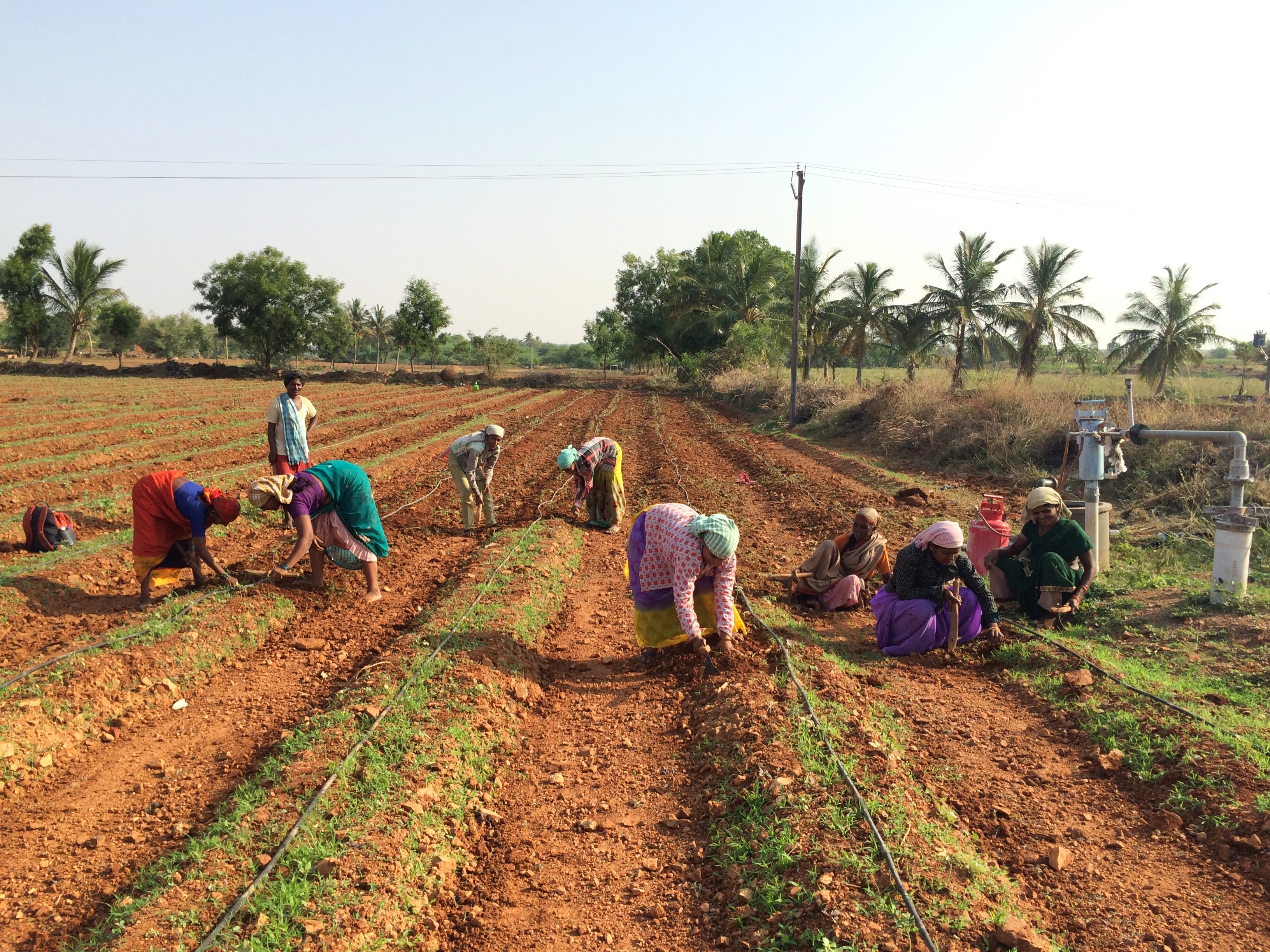 Organic Farmers in the Anantapur District, Andhra Pradesh, India in 2015
Photo credit: Laura Langner
Organic Farmers in the Anantapur District, Andhra Pradesh, India in 2015
Photo credit: Laura LangnerTheir vision is for rural communities to take control of their own lives, govern themselves and live in social, gender, and ecological harmony while maintaining a sustainable lifestyle.
- Organic Farmer Cooperative Program - Assists farmers in switching from industrial agriculture to organic farming, re-empowering farmers strapped by loans (due to high costs of chemical inputs & monoculture) through the support of the cooperative & knowledge sharing through farmers
- Dharani - Removes the middleman and allows organic cooperative farmers to directly profit from their crops & be economically protected through good/bad seasons. They attempt to engage with the market through a Cooperative model, with larger numbers being a source of strength and solidarity.
Navdanya
Vandana Shiva’s seed saving non-profit which has created 122 community seed banks in India to directly counteract industrial agriculture’s patenting of seeds and allow farmers to regain autonomy. ETC Group
ETC Group addresses the socioeconomic and ecological issues surrounding new technology that impact the world’s marginalized people. They investigate the erosion of ecology, culture, and human rights; monitor global governance issues including corporate control and concentration of technologies; and the development of new technologies, in particularly agricultural but also other technologies. They work closely with partner civil society organizations and social movements, especially in Africa, Asia, and Latin America.
More Resources on dismantling Industrial Agriculture:
Books, Articles, and Reports:
- Campbell, B. M., D. J. Beare, E. M. Bennett, J. M. Hall-Spencer, J. S. I. Ingram, F. Jaramillo, R. Ortiz, N. Ramankutty, J. A. Sayer, and D. Shindell. (2017). Agriculture production as a major driver of the Earth system exceeding planetary boundaries
- IPES-Food. 2017. Unravelling the Food–Health Nexus: Addressing practices, political economy, and power relations to build healthier food system
- Jacquet, P. &, & Pachauri, R. K., Tubiana, L. (2012). Towards Agricultural Change? Development, the Environment and Food
Obstacle 2:
Agribusiness, Transnational Corporations (TNCs), & Mega-Mergers
Agribusiness is the business of Industrial Agriculture and plays a role as a global hegemonic power pushing for land and water resource acquisition.
In the last couple of decades agribusiness corporations have been merging at an unprecedented rate. In 2001, six companies were the global leaders: Monsanto, Syngenta, Dupont, Dow Chemical, Bayer CropScience and BASF. These companies became known as the “the big six” and by 2013 they controlled 63% of comercial seed sales globally, and 75% of agricultural chemical sales around the world.
Back in 2016, there were The Big Six & ChemChina:
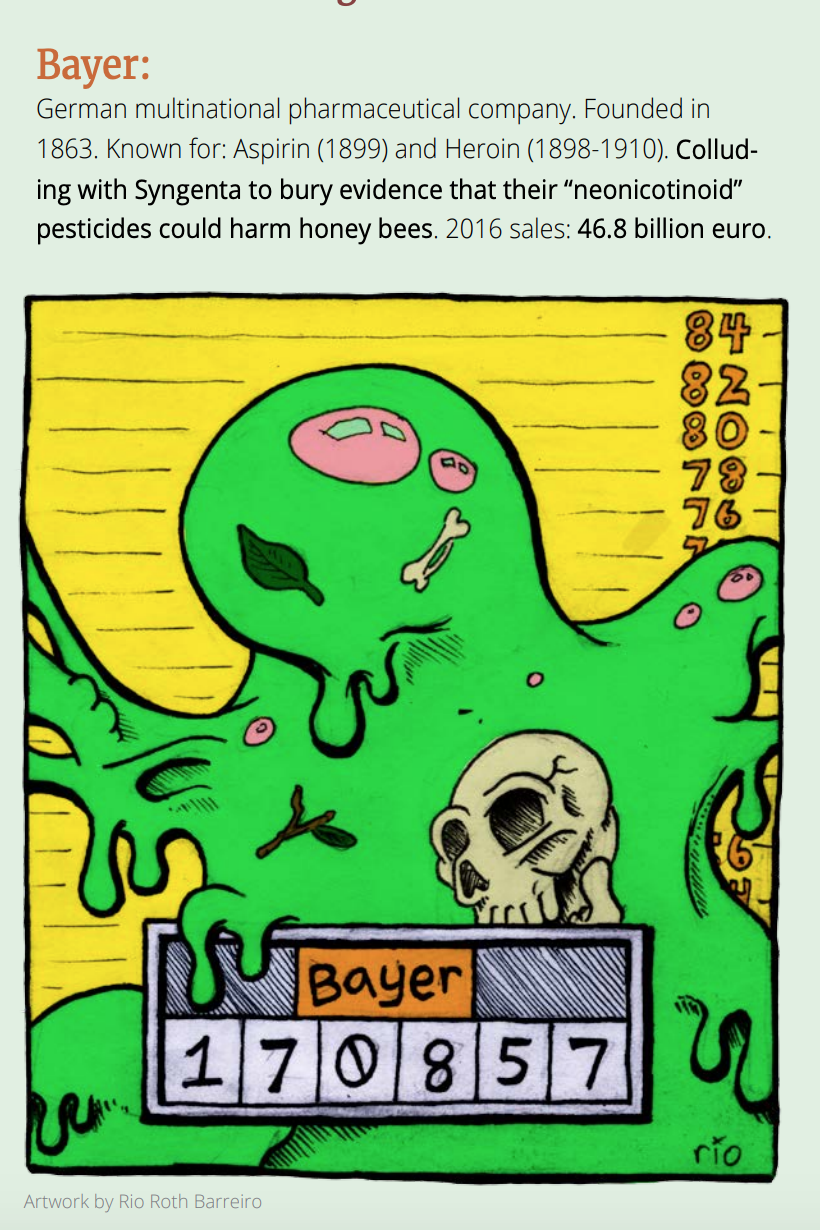
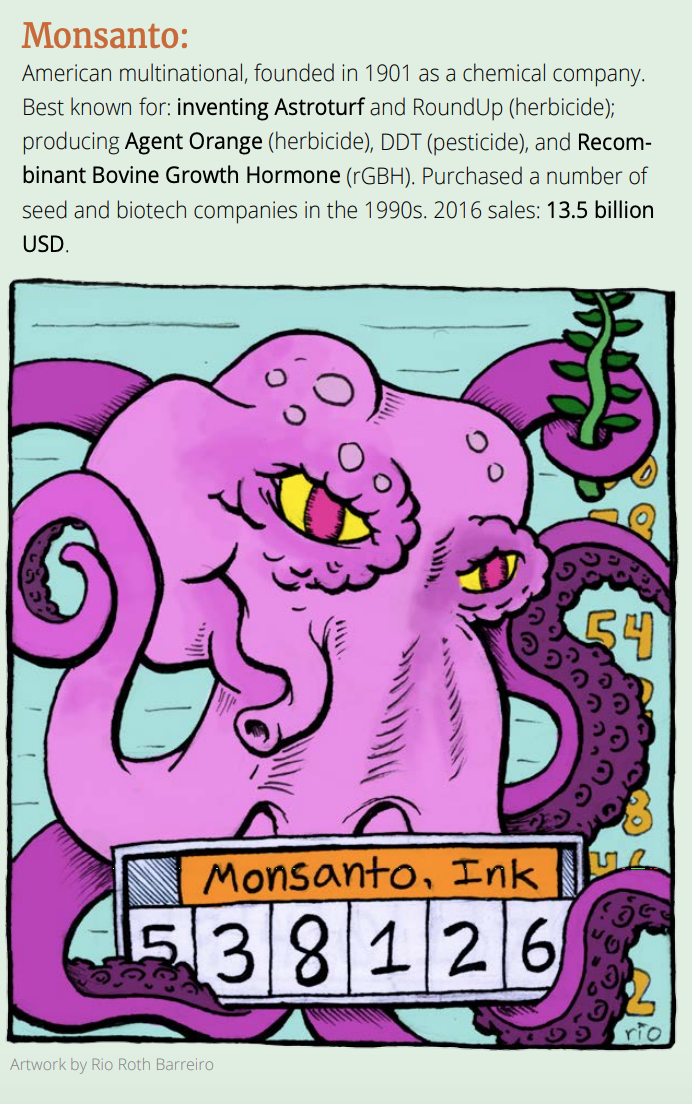
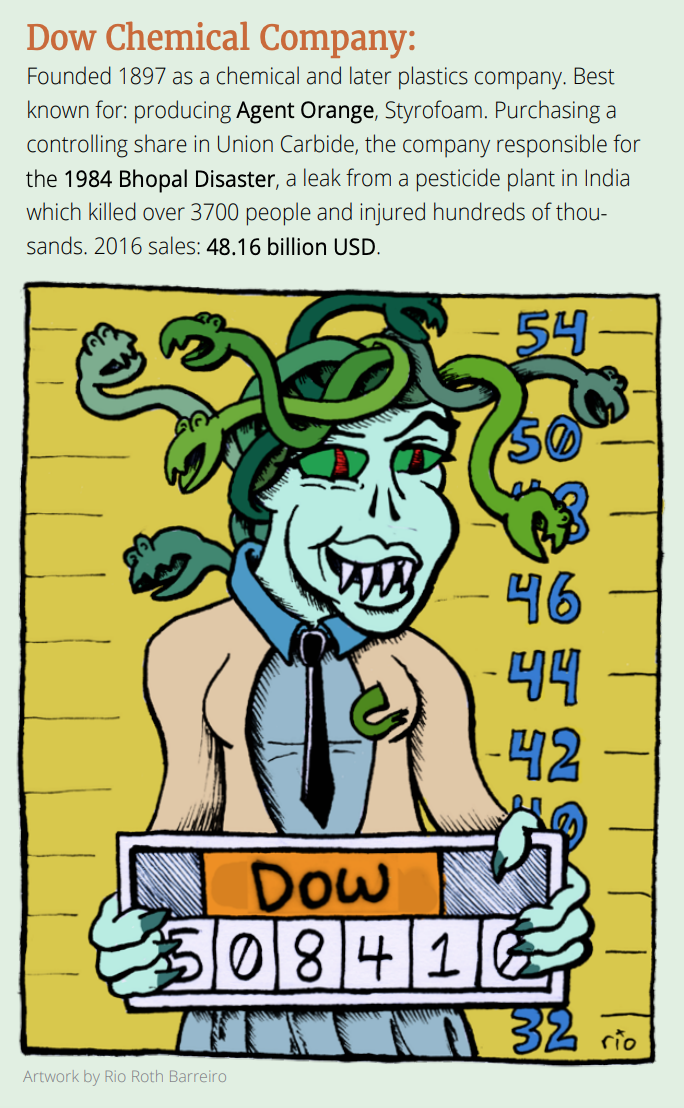

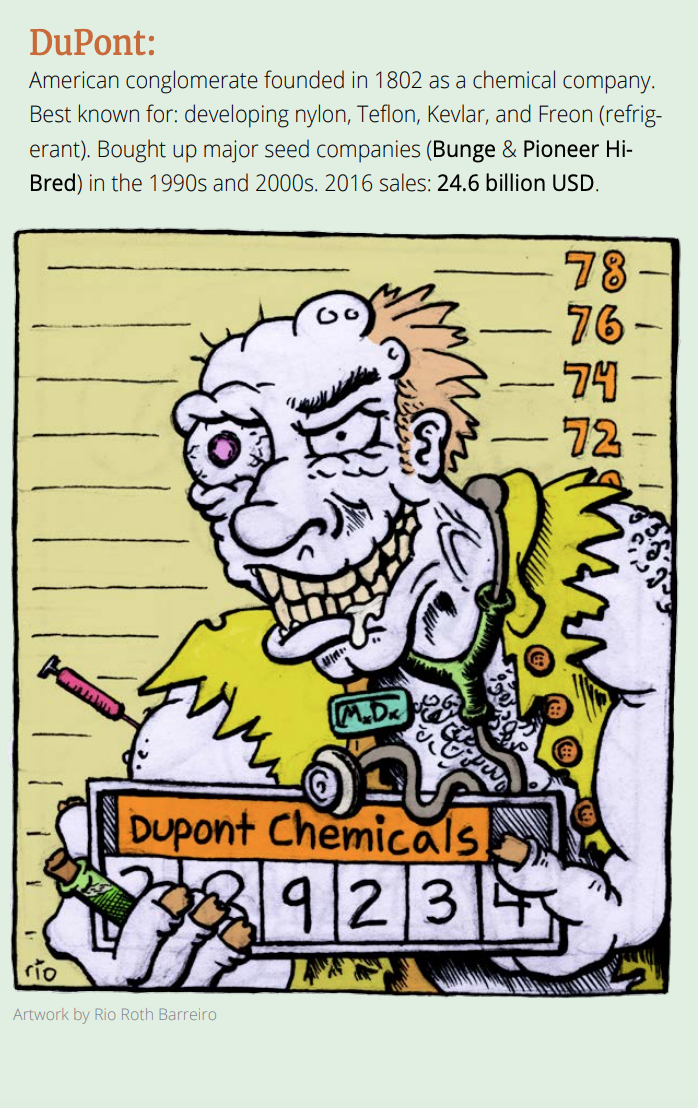
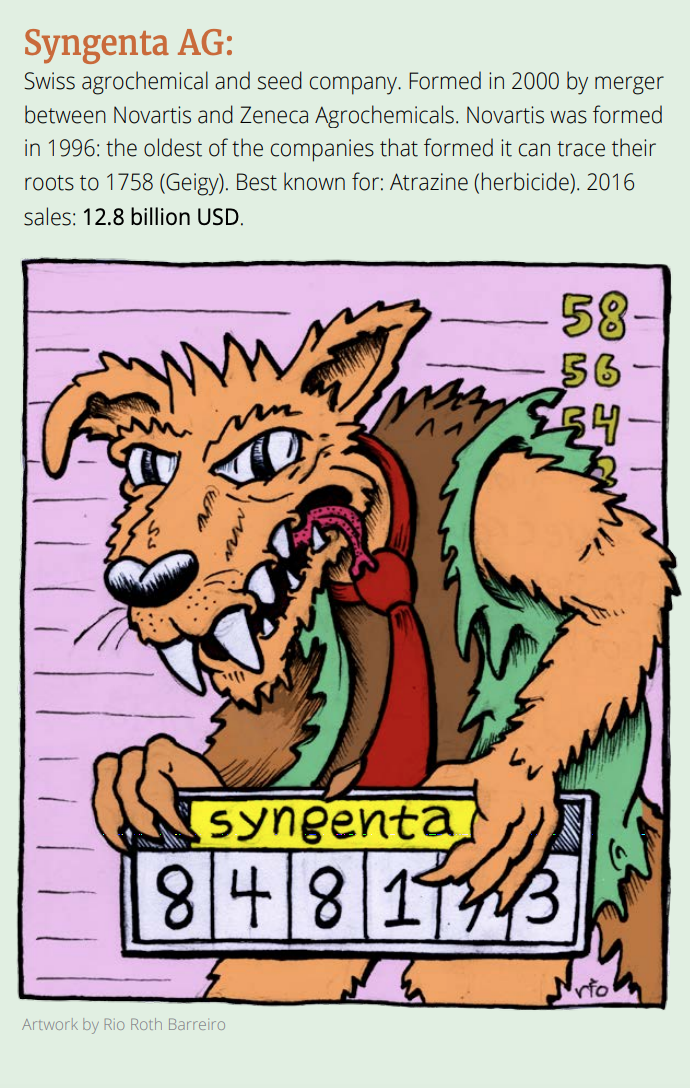
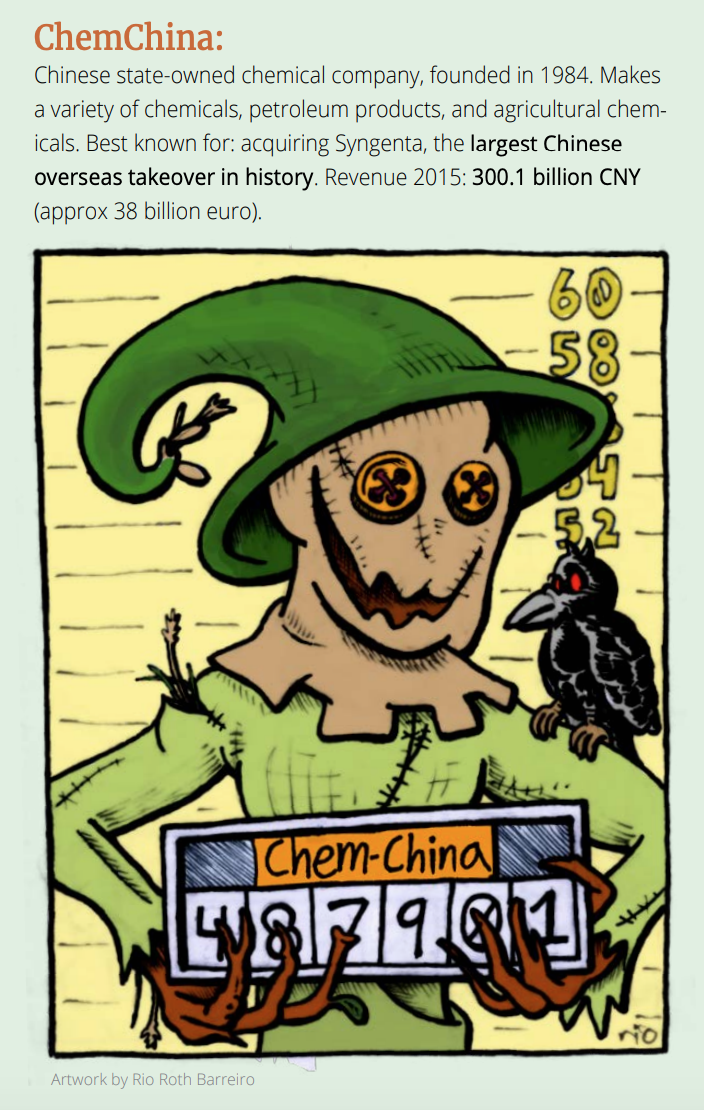
Then, in 2017, there was a push for further consolidation of monopoly corporatist power with the announcement of three agribusiness mega-mergers: ChemChina-Syngenta, Bayer-Monsanto, and Dow-DuPont. These mergers were approved by industry regulators.
The Big Six were now The Big Four: Bayer-Monsanto, DowDupont/Corteva, ChemChina-Syngenta, BASF.
Later, Dow-Dupont split into three chemical corporations in 2019: Dow, DuPont, and Corteva Agriscience.
Dow focuses on performance chemicals, chemical additives, and packaging. Market cap: $33.5 billion
Dupon focuses on specialty material, high-growth materials, and nutrition. Market cap: $49.6 billion
Corteva Agriscience focuses on agricultural chemicals and seeds. Market cap: $21.8 billion. Derives more than half its revenue from North America.
TNCs are involved at multiple levels of natural resource acquisition and degradation. TNCs have displaced local food retailers and promoted worldwide convergence of urban diet on a narrow range of staple foods as well as meat, edible oils, fats, sugars, and cheap unhealthy processed foods, contributing to the global epidemic of obesity and diet-related diseases.
Some well-known TNCs are*: Sime Darby Bhd, Dole Food Company Inc, Fresh Del Monte Produce, Cargill, Deere & Company, Nestle SA, Unilever, Kraft Foods Inc., Mars Inc., Coca Cola, Suntory Ltd.
*Source: World Investment Report: Transnational Corporations, Agricultural Production and Development.
Agribusiness and TNCs have created monopolies to hold power and control of our food systems. The world can no longer sustain this.
Organizations leading the fight against Agribusiness, Transnational Corporations, and Mega-Mergers:
La Via Campesina (LVC)
As the largest transnational agrarian movement, LVC has been the leader in the fight against agribusiness, TNCs, and extractive industries. They have developed multiple international campaigns to prevent further consolidation of power from corporations.Farmworker Association of Florida
The Farmworker Association of Florida, a member organization of La Via Campesina, focuses on protecting farmworkers and rural poor communities in Florida from the injustices and dangers of working on industrial agriculture farms including continual exposure to pesticides, extremely hot temperatures, and economic and physical exploitation as undocumented migrant workers and the surrounding community. Coalition of Immokalee Workers
This is a worker-based human rights organization internationally recognized for its achievements in fighting human trafficking and gender-based violence at work. - Fair Food Program
- Anti Slavery Program
- Campaign for Fair Food
- Facts and Figures on Florida Farmworkers
More Resources on dismantling Agribusiness, TNCs, and Megamergers:
Books, Articles, and Reports:
- Gonzalez, Carmen. 2016. The Environmental Justice Implications of Biofuels. Los Angeles: UCLA.
- Food and Water Watch. (2020). DOJ Fast Tracking Lethal Agricultural Mega-Mergers
- Organisation for Economic Co-operation and Development. (2018).Concentration in Seed Markets: Potential Effects and Policy Responses
- Reuters. (2020). ChemChina, Sinochem merge agricultural assets: Syngenta
- Ribeiro, Silvia. (2020). Breeding the Next Pandemic
- Starbuck, Amanda, C. (2020). Mega-Mergers Are As Guilty As the Pandemic for our broken Food Supply Chain.
- ETC Group & IPES-Food. (2017). Too Big to Feed: Exploring the impacts of mega-mergers, consolidation and concentration of power in the agri-food sector
- Transnational Institute. (2019). Mega-Mergers and the fight for our food system.
Obstacle 3:
International Financial Institutions (IFIs)
World Trade Organization (WTO)
The WTO Agreement on Agriculture (AoA) contained numerous ambiguities that enabled wealthy nations to subsidize and protect their domestic agricultural sector while constraining the ability for developing nations to utilize tariffs to protect their small farmers from economically devastating surges of cheap food (Gonzalez, 2011).World Bank (WB) and International Monetary Fund (IMF)
In the 1970s the Organization of Petroleum Exporting Countries (OPEC) pushed developing countries to take out loans from global North banks to pay for imported fuel and petroleum-based agricultural inputs. In 1979-80 oil prices shook while agricultural commodities‘ interest rates soared and prices dropped, making debtor nations in the global South unable to repay their loans (Gonzalez, 2011).The WB and IMF addressed this issue by imposing a structural adjustment (a standard receipt of free market reforms) on these indebted nations that eliminated subsidies to the agricultural sectors, it opened up their markets to foreign competition by reducing tariffs and other trade barriers (Gonzalez, 2011).Structural adjustment introduced a double standard in international agricultural trade that continues to the present day: open markets for the poor and protectionism for the wealthy (Gonzalez, 2011).
Organizations leading the fight against IFIs:
La Via Campesina
LVC is committed to fighting against the manipulation of international financial institutions over our food systems, peasant and land rights.Obstacle 4:
Extractive Industries
Extractive industries such as mining, drilling, and fracking are not only drivers of climate change, but they also have extreme detrimental effects on land and ecosystems, water sources, the air, local food systems and food sovereignty leading to serious repercussions on the livelihoods, health, culture, and economic well-being of local communities, predominantly rural, peasant, and indigenous communities worldwide.Organizations leading the fight against Extractivism: